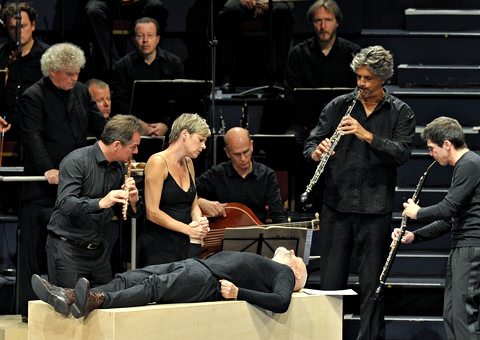Even for the perennially hopeful, the initial prospect of ghostly recitals given to the sound of one hand clapping dampened spirits. Last week something shifted. For the first time since March, an authentic future for orchestral life looks real. Countless problems, especially financial, have to be untangled. Audience and players must negotiate the new normal. Nothing will be easy. The cause of optimism? A concert at Snape Maltings, Aldeburgh – one of a series of weekend events there – performed by strings of the London Philharmonic Orchestra, conducted by Antonio Pappano.
The circumstances demonstrate how adaptable everyone has to be. Pappano should have performed in Snape a few weeks ago. That concert had to be cancelled. Edward Gardner, LPO principal conductor designate, was booked for this concert but was grounded in Norway (he’s in charge of the Bergen Philharmonic, with a season to open and quarantine a risk. In the course of writing this, three conductors dropped out of the Proms for comparable reasons). Pappano, with uncommon blanks in the diary, stepped in.
He took the opportunity to inaugurate Momentum, a post-Covid scheme set up by the singer-conductor Barbara Hannigan to support young artists. A top musician invites a rising talent to share their platform. Pappano chose the golden-toned Ukrainian baritone Yuriy Yurchuk, joining him as pianist in three Russian arias including Yeletsky’s painful declaration of love from Tchaikovsky’s The Queen of Spades – a surprise addition to a programme of Britten and Schoenberg. Yurchuk won huge cheers; 160 people (instead of the capacity 800) can make good noise.
Britten wrote his Serenade for Tenor, Horn and Strings (1943) for his partner, Peter Pears, and the horn player Dennis Brain. For decades, anyone else’s performance seemed like a poor cover version, either too derivative or too dissimilar: Pears had a distinctive, fluting, delivery suited to the six settings of English poems about night, from Ben Jonson to Blake to Keats. That voice is not to all tastes. The tenor Toby Spence brought welcome abandon and drama, with the LPO’s principal horn, John Ryan, nimble and nuanced throughout. In Tennyson’s The Splendour Falls on Castle Walls, with its repeated “Blow, bugle, blow”, Spence evoked the dizzying atmosphere, the purple glens and cliff and scar, with such immediacy, we were out there too, not merely hearing about it.
The 22-strong LPO strings captured every spark and shadow of the Britten, but their moment came in a yet more crepuscular score, Schoenberg’s Verklärte Nacht (Transfigured Night), 1899. Originally for string sextet, the string orchestra version – as heard in Snape – took on the scale and variety of a full symphony. It’s too easy to say Pappano’s opera background heightened the work’s strange, unresolved narrative – a man and a woman walk at night, the woman pregnant with another man’s child. Yet the ebb and flow of this single-movement work had thrilling clarity. Special praise to the LPO’s star principal viola (David Quiggle), ever busy in this work.
Despite an air of turmoil over aspects of the Proms – the absence of audiences, the wretched Rule, Britannia! debacle – a more promising episode heralded the final fortnight. Archive yielded to live concerts from an empty Royal Albert Hall. The BBC Symphony Orchestra, conductor Sakari Oramo, gave a “first night” that was really the 43rd, somewhat negating the excellent Proms from previous years relayed since mid-July.
The highlight was a short, delicately detailed world premiere by Hannah Kendall, Tuxedo: Vasco “de” Gama. Beethoven’s Symphony No 3 “Eroica” was played with zest and style, but having broadcast the same symphony on 30 July (the Hallé with Mark Elder, from 2014), was it the best choice? The following night, Jonathan Scott’s Symphonic Organ Prom was fun, wild and volatile, with enough crazy footwork to leave Astaire and Rogers standing.
On Sunday, the London Symphony Orchestra and Simon Rattle, with the pianist Mitsuko Uchida as soloist and orchestral player, gave a concert of true imagination. Thomas Adès’s Dawn: Chacony for orchestra at any distance (2020), built on simple pattern and repetition, was a short, glowing meditation rich with harp, bells, gongs, piano, cimbalom: a world premiere, spacious and spatial, written for any sized orchestra. Conversely, György Kurtág’s … quasi una fantasia… (1989) “for piano and groups of instruments dispersed in space” is poetic and aphoristic. Uchida, a renowned Kurtág interpreter, showed her affinity for this music.
To conclude, and in terrific form, the LSO reminded us of the melancholy beauty of Vaughan Williams’s Fifth Symphony (1943), from initial, haunting horn call to elegiac finale. So contrary to prejudice and resistance (mine), a concert can be great, even if no one’s there. And witnessing musicians back at work is some sort of miracle.
All three reviewed Proms are on BBC Sounds and BBC iPlayer











